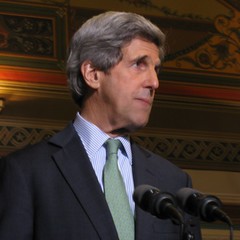Thursday
May212009
Statement by Center for Constitutional Rights on meeting with Obama
Vincent Warren, Executive Director of the Center for Constitutional Rights, met yesterday with President Obama. He released this statement:
CCR attended the meeting as did ACLU, Human Rights Watch, Charlie Swift and others. The president did not preview his speech for us. The president was very open in hearing CCR's concerns on a range of guantanamo policy issues. I came out of the meeting deeply disappointed in the direction that the administration is taking and I don't see meaningful differences between these detention policies and those erected by President Bush.





 Thursday, May 21, 2009 at 10:03AM
Thursday, May 21, 2009 at 10:03AM

Venezuelan Lawyer Says Chavez Has Compromised Judicial System
Human Rights Attorney Gonzalo Himiob Santome exposed Venezuelan President Hugo Chavez’s judicial corruption at a press conference at the National Press Club on Wednesday.
“Several cases... have proved that the judicial system in Venezuela has been deteriorating in order to be used as a weapon for persecution and intimidation of the opposition and the political dissidents,” Himiob said.
Himiob was in Washington D.C to introduce a book he and attorneys Robert Amsterdam and Antonio Rosich wrote that documents the case of Eligio Cedeno, a victim of repeated human rights violations by the Venezuelan government.
According to Himiob, “In common crime, from 306, 000 cases reviewed by the general attorney’s office on 2008, only 8000 cases were submitted to formal accusation. That led us to a conclusion that there is a 97% impunity rate of common crimes.” Himiob added that “If the judicial system is not working for persecuting the criminals, what are they doing?”
“In this case, it's very clear that it doesn't matter that they are guilty or not. The thing is [they] use the procedures themselves as a punishment... no matter if [the accused] are innocent or not. They are showing that they can submit you to a trial and they can hold you in prison without any respect to the regulations, internal and international regulations. just because they want to make you feel their power over you,” Himiob added.